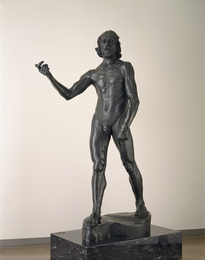Updated 08 April 2025
On Display Permanent collection
Saint John the Baptist Preaching
| Date | 1880 (model), 1944 (cast) |
|---|---|
| Materials and Techniques | bronze |
| Size(cm) | 201 x 58 x 127 |
| Inscriptions | Signed front top of base: A. Rodin; Foundry mark back of base: Alexis. Rudier / Fondeur. Paris |
| Credit Line | Matsukata Collection |
| Standard ref. | M1300 |
| Category | Sculptures |
| Collection Number | S.1959-0052 |
The model for this work was an Italian farmer. Rodin recognized the farmer's strong bearing and physique, and his artless mystical quality when he came to visit Rodin's studio. As soon as Rodin saw this man he thought of St. John the Baptist. The farmer took off his clothes and stood on the model dais "With his face raced, his upper body straight and proud and his two legs spread like a compass." When Rodin saw this firm pose he decided on the theme of "Walking." The Walking Man made in the process of the creation of this work is a standing figure that consists solely of a torso and legs. Both feet are on the ground and the movement of his legs "spread like a compass" show the slight shift caught in a single moment of time. If a photograph was taken of a single instant of the movement of a walking model, we would see that when the back foot is firmly on the ground, the front foot would not yet be fully on the ground, and vice versa. This figure of St. John the Baptist has both feet firmly planted on the ground. No such moment exists when a person is actually walking. However Rodin states "It is the artist who speaks the truth and the photograph that lies. This is because there is no moment when time is actually stopped." (Source: Masterpieces of the National Museum of Western Art, Tokyo, 2009, cat. no.127)
Provenance
Bought from Musée Rodin by Kojiro Matsukata, Kobe through Léonce Bénédite, ca. July 1921, as ‘St Jean Baptiste’ (Fr. 35,000) [see several letters between Bénédite and Suzuki & Co., July 1921, in Archives of Musée Rodin, Paris; copy in NMWA curatorial files]; sequestered by French government, 1944; vested in French government under San Francisco Peace Treaty, 1952; transferred from French to Japanese government, 23 January 1959; entered into NMWA, April 1959.
Exhibition History
- 1966
- Rodin, National Museum of Western Art, Tokyo, 23 July 1966 - 11 September 1966, cat. no. 8
- 2014
- Voices Calling from the Unusual: Hirano Keiichiro's Selection of Western Art Masterpieces, National Museum of Western Art, Tokyo, 8 April 2014 - 15 June 2014, cat. no. 26
- 2022
- Renoir—Monet—Gauguin: Images of a Floating World: the Collections of Kōjirō Matsukata and Karl Ernst Osthaus, Museum Folkwang, 6 February 2022 - 15 May 2022
Bibliography
- 1989
- Goldscheider, Cécile. Rodin, vie et œuvre, Tome I. Paris, Wildenstein Institute, 1989, pp. 124-129, no. 102.
- 1990
- The Old Matsukata Collection. Kobe City Museum, ed. Kobe, "Matsukata Korekushon Ten" Jikkoiinkai, 1990, cat. no. S-66.
- 2006
- Masterpieces of The National Museum of Western Art, Tokyo. Tokyo, The National Museum of Western Art; Tokyo, The Western Art Foundation, 2006 (Japanese, preface in Japanese and English), no. 127, repr.
- 2009
- Masterpieces of The National Museum of Western Art, Tokyo. Tokyo, The National Museum of Western Art; Tokyo, The Western Art Foundation, 2009, no. 127, repr.
- 2013
- Masterpieces: The National Museum of Western Art, Tokyo. Tokyo, The Western Art Foundation, 2013 (Japanese, preface in Japanese and English), no. 128, col. repr.
- 2019
- The Matsukata Collection: Complete Catalogue of the European Art. Kawaguchi, Masako; Jingaoka, Megumi, eds. vol. 2: Sculpture, Drawings, Prints and Decorative Arts and Other Works, Tokyo, The National Museum of Western Art, Tokyo, 2019, cat. no. 1300, col. repr.
- 2022
- Renoir—Monet—Gauguin: Images of a Floating World: the Collections of Kōjirō Matsukata and Karl Ernst Osthaus (exh.cat.). Engel, Nadine; Herlemann, Rebecca, eds. Berlin, Hatje Cantz, [2022], pp. 239, 367, col. repr.





